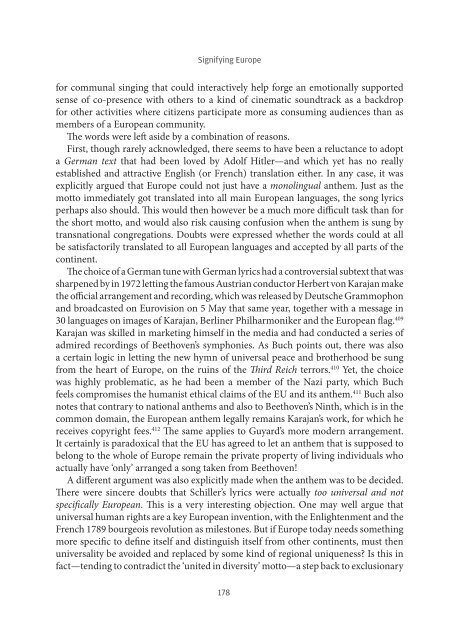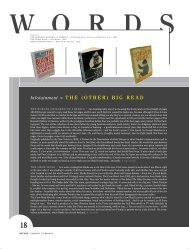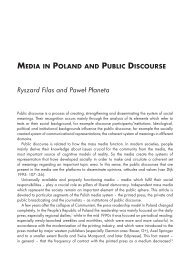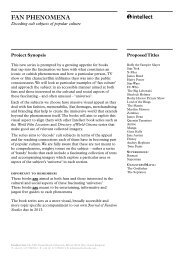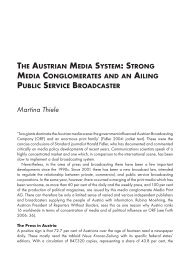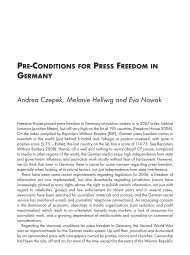Anthem - Intellect
Anthem - Intellect
Anthem - Intellect
Create successful ePaper yourself
Turn your PDF publications into a flip-book with our unique Google optimized e-Paper software.
Signifying Europe<br />
for communal singing that could interactively help forge an emotionally supported<br />
sense of co-presence with others to a kind of cinematic soundtrack as a backdrop<br />
for other activities where citizens participate more as consuming audiences than as<br />
members of a European community.<br />
The words were left aside by a combination of reasons.<br />
First, though rarely acknowledged, there seems to have been a reluctance to adopt<br />
a German text that had been loved by Adolf Hitler—and which yet has no really<br />
established and attractive English (or French) translation either. In any case, it was<br />
explicitly argued that Europe could not just have a monolingual anthem. Just as the<br />
motto immediately got translated into all main European languages, the song lyrics<br />
perhaps also should. This would then however be a much more difficult task than for<br />
the short motto, and would also risk causing confusion when the anthem is sung by<br />
transnational congregations. Doubts were expressed whether the words could at all<br />
be satisfactorily translated to all European languages and accepted by all parts of the<br />
continent.<br />
The choice of a German tune with German lyrics had a controversial subtext that was<br />
sharpened by in 1972 letting the famous Austrian conductor Herbert von Karajan make<br />
the official arrangement and recording, which was released by Deutsche Grammophon<br />
and broadcasted on Eurovision on 5 May that same year, together with a message in<br />
30 languages on images of Karajan, Berliner Philharmoniker and the European flag. 409<br />
Karajan was skilled in marketing himself in the media and had conducted a series of<br />
admired recordings of Beethoven’s symphonies. As Buch points out, there was also<br />
a certain logic in letting the new hymn of universal peace and brotherhood be sung<br />
from the heart of Europe, on the ruins of the Third Reich terrors. 410 Yet, the choice<br />
was highly problematic, as he had been a member of the Nazi party, which Buch<br />
feels compromises the humanist ethical claims of the EU and its anthem. 411 Buch also<br />
notes that contrary to national anthems and also to Beethoven’s Ninth, which is in the<br />
common domain, the European anthem legally remains Karajan’s work, for which he<br />
receives copyright fees. 412 The same applies to Guyard’s more modern arrangement.<br />
It certainly is paradoxical that the EU has agreed to let an anthem that is supposed to<br />
belong to the whole of Europe remain the private property of living individuals who<br />
actually have ‘only’ arranged a song taken from Beethoven!<br />
A different argument was also explicitly made when the anthem was to be decided.<br />
There were sincere doubts that Schiller’s lyrics were actually too universal and not<br />
specifically European. This is a very interesting objection. One may well argue that<br />
universal human rights are a key European invention, with the Enlightenment and the<br />
French 1789 bourgeois revolution as milestones. But if Europe today needs something<br />
more specific to define itself and distinguish itself from other continents, must then<br />
universality be avoided and replaced by some kind of regional uniqueness? Is this in<br />
fact—tending to contradict the ‘united in diversity’ motto—a step back to exclusionary<br />
178


